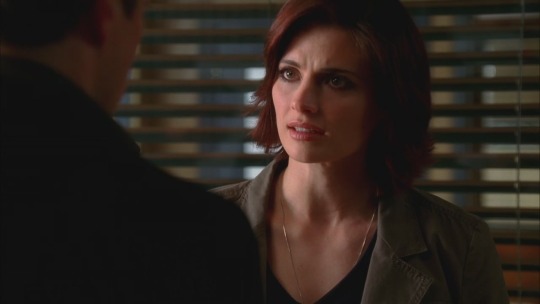#ace is a dork don’t let this image fool you
Explore tagged Tumblr posts
Text

showing off for the housewarden 🏀
#do ants have integrity#riddle rosehearts#ace trappola#ridoace#twisted wonderland#twst#I didn’t get ace’s club uniform and I’m so sad about it#ace is a dork don’t let this image fool you
324 notes
·
View notes
Photo


Title: The Glass Cell WC: 1600
“You know reality isn’t fiction, right?” — Dr. Clark Murray, A Death in the Family (1 x 10)
She wears a dress of her mom’s to prom, he decides. He imagines it in detail—cut-work lace over taffeta in bright emerald green, a satin empire waist band a shade darker, a full A-line skirt. He envisions her with mismatched quasi-punky hair hanging down to half hide her dramatic eye-makeup. She stands out, of course. In a sea of off-the-shoulder, halter neck, heavy fabrics in primary colors—crayon red, royal blue, black, black, white, white, red again, with an ill-advised plunge neckline. She stands out.
She likes her date, though she doesn’t exactly let him know that. He imagines that, too. She doesn’t exactly let anyone know that she likes this boy on the verge of being a man, because she’s not sure that she’s supposed to. He’s quiet and sensitive. Not a dork—not outright unpopular, but a dark horse candidate for asking her in the first place, and her unexpected, unhesitating yes had sent shockwaves through the eleventh grade.
She is awkward on the dance floor. She is a vision in her mother’s dress, but there is architecture to it. There is a hidden foundation that requires time travel of her ribs, her spine, her hips, and her date—the boy on the verge of being a man—has no idea where to put his hands during the slow songs. She has no idea where to put hers, so she locks her fingers behind his neck. She breathes Let’s get out of here well before Boyz II Men get to the spoken-word part, and they do.
They race across the ballroom with their fingers linked, laughing like fools. They leave her friends, his friends, the tiny intersection of their friends to gawp as they bang through the double doors.They roam the streets around the hotel in a spiral pattern, talking and talking.
She shivers and pulls the cream-colored silk-and-seed-pearl wrap close around her. With well-intentioned gallantry, he tries to drop his tuxedo jacket over her shoulders. He misses, and they both watch in horror as the long tails drag through something nameless and awful before he can catch it.
The hem of her dress is dirty and her mom’s dyed-to-match pumps with their rhinestone butterfly clips will never be the same. But they share french fries at a nameless diner. They share a tentative kiss in the back of a cab as the boy escorts her home. They share a burning, frenzied, back-against-the-glass follow-up in the doorway of her apartment as the sun comes up.
She misses curfew by a lot. Her mom brings her coffee and toast in bed long after morning has tipped over into afternoon. She asks a million impertinent questions about the boy she likes, about the evening, about her plans to save up for what should be an astonishing dry cleaning bill.
This is how it happens. This is what he decides.
**********************
She sprains her ankle on move-in day. He knows. He sees clearly how the events unfold.
She has a plan. She has keys in hand by 8:01 am. She has a spot for the van with her things, hardly a block away, and her second-hand office chair can serve as a makeshift dolly. She has almost nothing. It’ll be two dozen quick trips, she figures, but the apartment is full of junk.
Oh yeah, the creepy building manager tells her, last guy skipped out.
The junk is her problem, apparently. Her problem. She plumps down on some kind of ottoman and immediately regrets it as an oily smell rises up. It’s not just the ottoman, though. The whole place reeks of food and animal fat. She registers the distant clatter of dishes, of silverware, and the hiss of a hot grill rising up through the floor.
She props her elbows on her knees and her chin on her fists. She wastes ten precious minutes of the three hours before she has to have the van back contemplating the space that is smaller, dingier, filthier than the unit she saw when she signed the lease.
She hauls herself up and lugs the ottoman and a broken laundry basket full of dirty t-shirts with her down to the dumpster. She bumps milk crates full of electronics odds and ends down the stairs. She carries awkward lamps like jousting lances.
It’s a box of kitchen things that does her in. It’s a mile wide and heavy. She knows she should unpack and repack it. She should make two trips, three, four, but she’s tired of this. She misses a step. She goes down to the landing. She can feel the rush of heat into the ankle she has wrenched badly.
There’s a neighbor—a pair of neighbors—who hear the commotion. They rescue her, Cleo and Pete, who are just a little older than she is. They extricate her from underneath the box. They help her into their apartment and give her an ice pack. They give her a stiff drink and an ace bandage.
They share stories about the guy who skipped out in the middle of the night—his questionable activities and his even more questionable taste in music. They order pizza and won’t take her money when she offers. The three of them agree that the building manager almost certainly collects clown paintings by serial killers.
They insist that she spend the night on their couch. She protests. She tries to put weight on her ankle, then gives in. She spends her first night not in her first apartment staring at a ceiling that belongs to strangers with tears leaking from the corners of her eyes because her fucking ankle hurts. Because she doesn’t have the money to pay for another day of the damned van. Because her mother is dead and she is alone in the world.
He knows all this. He sees it clearly.
************************
He cannot picture the shadows on her skin in that basement room. He sees the backs of his own hands criss-crossed infinitely with weak, unflattering light coming in through the cage. But he cannot see hers. Would her fingernails be as neat and no-fuss as they are today, or would they have been ragged with the pain of all the long years before she made it that far?
Would she—and the possibility is like a lattice work of burning hot ice spreading through him from the inside—would she have gotten the chain for her mother’s ring when she first put on the uniform? Was there a time in that dingy apartment—in her college days with her dad drowning and her left wrist as yet bare—was there a time when when she would have slipped it on her finger each morning instead of ducking her head to let the delicate links of a think gold chain slither down over her collar bones?
He doesn’t know, any more than he knows if she would have risked the rickety table with its hard, back-breaking chair. He cannot say whether she would have waited for the most desolate hour each possible night, then set to work right where he did, or if she would have, instead, arranged herself on the cracked tile floor, knees drawn up and hunched over the tight beam of a penlight.
He looks for signs of her in the creases and ragged edges, the rusty indentation of an ancient paperclip removed and replaced, the corner of a thin stack torn away along with a now-missing staple in a moment of frustration. He scours the faded, triple-carbon paperwork and holds the glossy, terrible photos at an oblique angle to the light from his desk lamp, the light from his computer screen. In the riot of smudged, overlapping fingerprints he wonders which might be hers.
It’s no use, this afterthought of a search. She is nowhere. There is no detail remembered from his own few hours spent in that basement room, no physical trace of her presence in the file itself that sparks the rush of absolute clarity with which he envisions her at the junior prom, her on move-in day at that first three-story walk-up that smelled of chicken wings.
She is nowhere, because he has never once bothered to imagine her—not once. He relives the abrupt sting of her rapped out pair of questions—You don’t think I’ve haven’t been down there? You don’t think I haven’t memorized every line in that file? He sits, staring at the file now with tide of shame advancing, receding, advancing.
He didn’t think. In all these weeks, he has not once thought about the space between the wound delivered and the scars she bears. He has not once thought about the dreams she must have cast off, what it must have cost her to forge a path to that basement room. He has not once considered what those long years must have been like. He has never stopped to ask himself how the woman she is now—the relentless, fiercely intelligent, extraordinary woman he has come to know—could ever have come to accept her mother’s death as a random, wayward event.
He thinks now. He asks himself now. He tries, now, to picture the shadows on her skin, the tense outline of her body and the tight beam of a penlight. He tries to imagine that lonely work, but he can’t.
She is gone from him. She is nowhere. A/N: This is an especially weird not!thing. I had to decide that Castle has the actual Johanna Beckett file that he’s taken, not just copies. That doesn’t make much sense, but the autopsy photos look to be originals, complete with labels and handling wear. Fixation on those details is just a distraction from how not a thing this is.
images via homeofthenutty
#Castle#Caskett#Castle: Season 1#Castle: A Death in the Family#Kate Beckett#Richard Castle#Johanna Beckett#Jim Beckett#Fic#Fanfic#Fanfiction#Fan Fic#Fan Fiction#Writing#Interrogatives?
10 notes
·
View notes